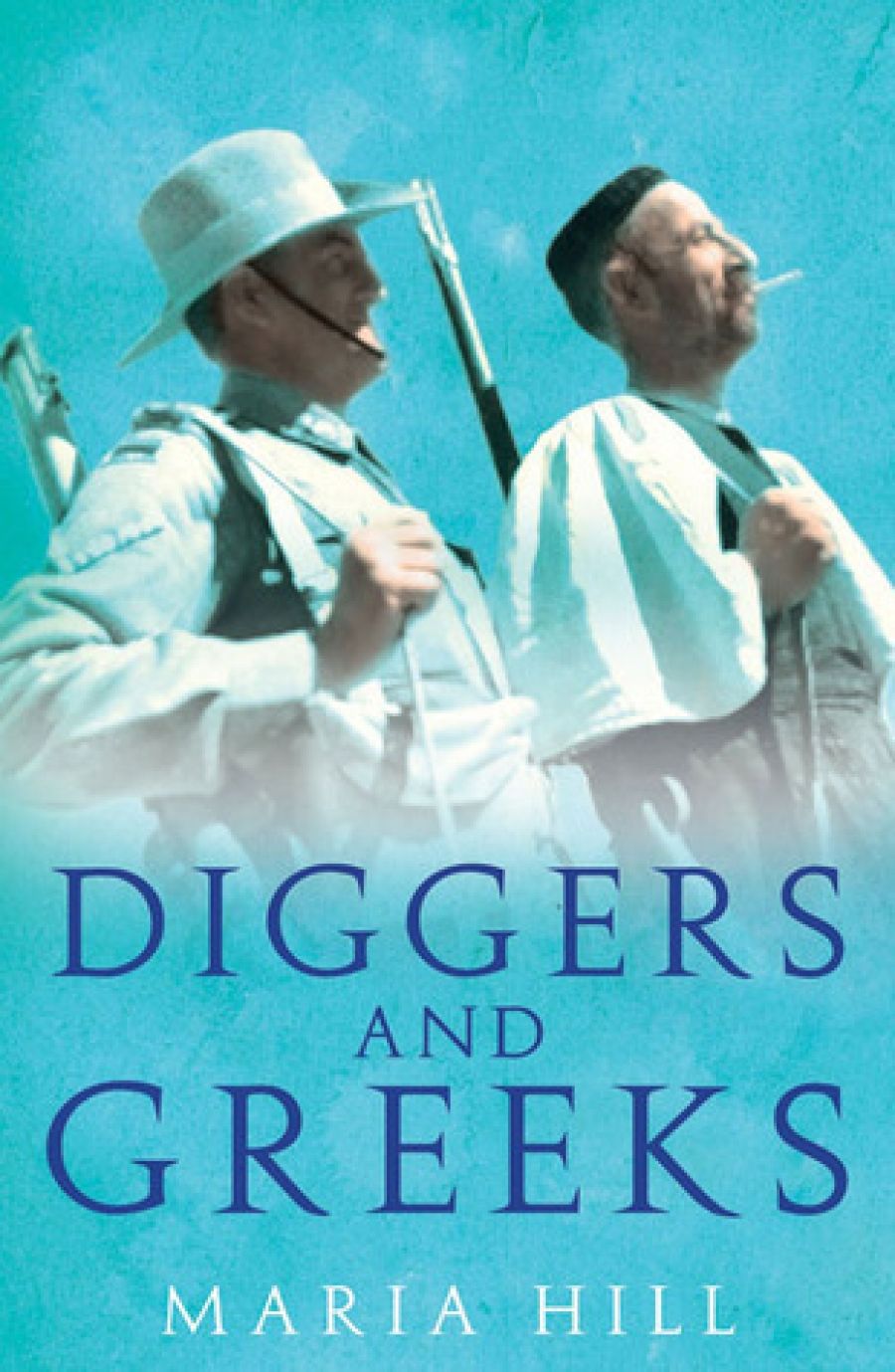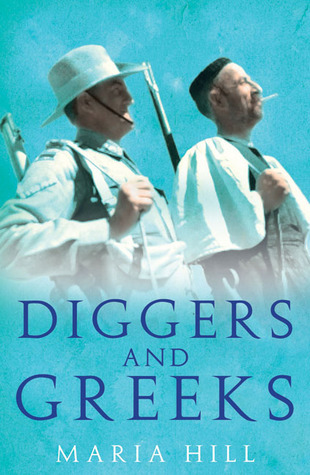
- Free Article: No
- Contents Category: Military History
- Review Article: Yes
- Article Title: Ending the Dutch auction
- Article Subtitle: Another book on a ‘forgotten’ war
- Online Only: No
- Custom Highlight Text:
Late in 1944 Richard Turner was at last able to come home. A Sydney taxi driver, he had been captured in Greece in June 1941. Like 2,000 other Australians, he missed the last boats to leave. Though captured by the Germans, he soon escaped to join the andartes – partisans fighting the Germans in Greece’s rugged interior. With the Germans pulling out, British officers managed to contact Richard and he was finally able to leave for home after nearly five years. On 17 December 1944 the lorry taking Richard to Athens airport accidentally drove into one of the first firefights of the Greek civil war. Richard now lies in the beautiful war cemetery at Phalereon, an oasis of peace amid the traffic that chokes Athens.
- Book 1 Title: Diggers and Greeks
- Book 1 Subtitle: The Australian campaigns in Greece and Crete
- Book 1 Biblio: UNSW Press, $59.95 hb, 496 pp
- Book 1 Cover Small (400 x 600):

Maria Hill’s Diggers and Greeks bears the hallmarks of the clunky doctoral thesis upon which it is based. Let’s get the unpleasantness out of the way before considering its value. It is otiose, with a tedious literature review and a repetitive ‘conclusion’ to each chapter. It often seems more compiled than written, with too many long and often unnecessary quotations. UNSW Press deserves no plaudits for failing to exercise the discipline the author lacked.
For a supposedly neglected campaign, the Greek one of 1941 seems to have attracted a great deal of attention, and Dr Hill quotes from much of it. We have seen a string of popular and unit histories, memoirs and biographies of those involved: Mark Johnston’s At the Frontline: Experiences of Australian Soldiers in World War II (1996) and Peter Ewer’s Forgotten Anzacs: The Campaign in Greece, 1941 (2008), an Australian and New Zealand oral history of the campaigns. Now there is also Peter Thompson’s Anzac Fury: The Bloody Battle of Crete (William Heinemann, $49.95 hb, 518 pp, 9781741669206, 2010). The higher politics of the Greek commitment have surely been amply canvassed by several international authors and, among the Australians, Carl Bridge, David Day and David Horner.
How remembered does an event have to be before it stops being ‘forgotten’? Could we just end this Dutch auction of ‘my campaign’s more forgotten than yours’, a habit to which Australian authors and publishers seem more susceptible than most? (Characteristically, this is a study of the Australian campaigns. Forget the more numerous New Zealand and British participants. The parochialism is breathtaking.)
But who says Greece is ‘forgotten’? And what constitutes due remembering? What degree of attention or regard should modest, failed campaigns involving one Australian division deserve? A book a year? An ‘iconic’ feature film – Crete? An annual day of commemoration? Recognition of, say, the battle of Retimo among a sample of shoppers in any given mall in suburban Australia? It is not Gallipoli or Kokoda, but Greece does better than, say, Lebanon-Syria (for which we can’t even get the name right), though not as well as Singapore, which seems about right.
The Greek campaigns saw disasters less disastrous than Dunkirk, Singapore – or the loss of Tobruk in 1942 (because no Australians surrendered there, it fails to register here). But they were bad enough, with ten to fifteen thousand troops captured (Dr Hill gives three different figures) and precious warships lost. Yes, it was a balls-up. Yes, Churchill was to blame (well, after the German Twelfth Army, of course). Yes, four fifths of the Australians captured in the war against Germany were taken in Greece. And yes, it was small-minded that Australian veterans were forbidden to wear commemorative medals awarded by a grateful Greece in the 1980s. All this seems pretty much agreed; so what’s the problem? Indeed, how a campaign manages to be simultaneously both notorious and neglected eludes me.
Sadly, Dr Hill’s indignation at Churchill’s chicanery obscures an opportunity to explain what happened, and especially why. Why send the theatre’s best troops to bolster a faltering ally beset by an actual Italian invasion from Albania and an imminent German invasion from Yugoslavia? It seems like folly rather than knavery. Here, Dr Hill fails to persuade us that she even under-stands the question, let alone is able to provide an answer. She argues that the Greek commitment, far from being high-minded, a forlorn hope to defend a weak ally, was ... what? It is hard to understand what she thinks, but she’s pretty sure it was dubious, though she doesn’t exactly explain why ‘the British’ (whoever they were) should so cynically throw away a force so badly needed in North Africa on a campaign ‘they’ are supposed to have known was futile.
Diggers and Greeks is the first Australian book about the campaign to draw on Greek sources. (Dr Hill deserves credit for her energy; outrageously, the Greek national archives allows researchers to consult just three files daily. No wonder it is only open for half the day.) Sadly, though, she doesn’t cut through the partisan writing that bedevils the records of that campaign. Indeed, because her account treats Greek sources insufficiently rigorously it arguably adds a layer of special pleading and too often confuses rather than clarifies both the complex reality and the self-interested literature.
But Diggers and Greeks achieves something that no other Australian book on the Greek campaigns has attempted. Dr Hill takes us into the experiences, feelings and memories of the Greek people. What is more, she treats the complex relationships between them and the clumsy but well-meaning slouch-hatted soldiers who came among them for those few months in 1941. That is a most worthwhile contribution. At its best Diggers and Greeks shows that military history is compatible with the sensitive analysis of cultures brought together by war.
For Australia, the Greek campaigns began in March 1941 and ended with withdrawal and defeat three months later. A few intrepid evaders got out months later, some like Richard Turner fighting with partisans for years, but ‘Greece’ for most Australians lasted a few months. For the Greeks, the departure of Allied troops marked only another stage in a war that had begun in October 1940, with the Italian invasion. It was to entail a harsh occupation (including widespread starvation over the winter of 1941–42), while the German departure and British liberation heralded not victory and peace, but the beginning of a savage civil war. That ideological conflict continues to make Greece’s wartime history a subject of intense sensitivity. Dr Hill acknowledges the Greek disinclination even to discuss the war, and she alludes to the reluctance of Australian ‘veterani’ to criticise a nation that has welcomed them in recent decades.
There is a shorter, better book within Maria Hill’s 496-page brick. If only she had concentrated on the story that perhaps only she can tell: the relationship between the people of mainland Greece and Crete and the Australian soldiers. That story, occupying perhaps a third of this sprawling, ill-disciplined narrative, makes a much stronger contribution to our understanding of the ways in which Australians have, through war, affected the lives of the peoples in whose countries they have too often fought. Rather than thinking of Diggers and Greeks within the plentiful literature of Australia’s ambiguous relationship with the Greek campaign, we ought to look at this book as a pioneering work within a different, much less populated tradition in Australian historical writing.
Though Australians have found themselves at war in about thirty countries since they first fought overseas in 1860, we have surprisingly few studies of how they regarded the locals, how the locals viewed their guests (welcome or not), and how the two got on. We have Suzanne Brugger’s pioneering The Australians and Egypt (written in the early 1970s and therefore able to draw on the memories of elderly Egyptians; not always positive ones). We have Robin Gerster’s frank examination of British Commonwealth Occupation Force’s time among the people of occupied Japan. But we don’t really know how Australians related to the people of Papua New Guinea or Borneo, and there is a good book to be written on Australian relationships with the Jews of Palestine. Several writers have looked at Australians in Britain, but we still don’t have a book on how Australians lived among the people of France and Belgium. Maria Hill’s work is, in this respect, a notable achievement. She has troubled to gather sources generally opaque to Australians and has made good use of her standing as a Greek-Australian, even if she is invariably inclined to be sentimental in using these sources.
So we have the classic curate’s egg; a book that confuses rather than clarifies our understanding of the reasons Australian troops became involved in Greece, and an inadequate account of the fighting; but also a book that illuminates, as has no other, their complex relationship with the people of that country, then and since.


Comments powered by CComment